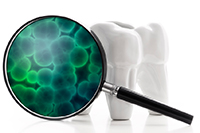
Preventing Plaque Formation
There are many ways we can protect our teeth from plaque formation, with the most common method being regular brushing. Most dental experts recommend brushing at least twice every day while paying close attention to the spaces where the teeth and gums meet. It is also essential to use toothpaste that contains fluoride for thorough cleaning; aside from thoroughly brushing your teeth, flossing at least once a day goes a long way in removing food particles and bacteria.
Patients are also advised to use an anti-bacterial mouth rinse, which helps to reduce the plaque-causing bacteria and gum disease. With all the different brands, a dentist can help you narrow down the search by recommending a particular mouth rinse.
Although maintaining good oral hygiene is vital, it is advisable to regularly visit an oral hygienist or dentist for a checkup and teeth cleaning. Having an expert clean your teeth gives you peace of mind, knowing that you are in the hands of a professional. They also have specialized equipment and top-of-the-line products that guarantee enhanced protection for the patient[[[char:39]]]s teeth.